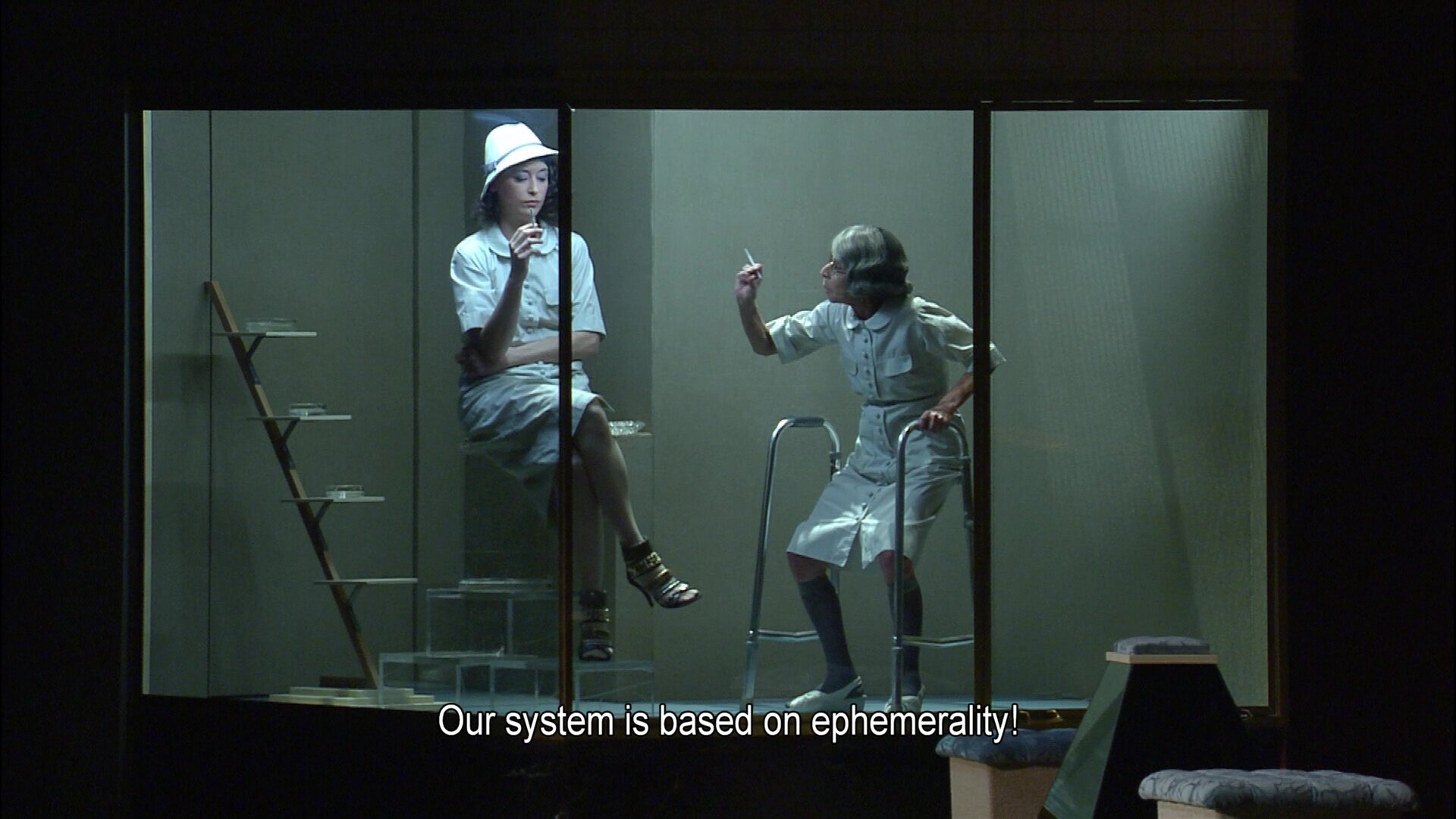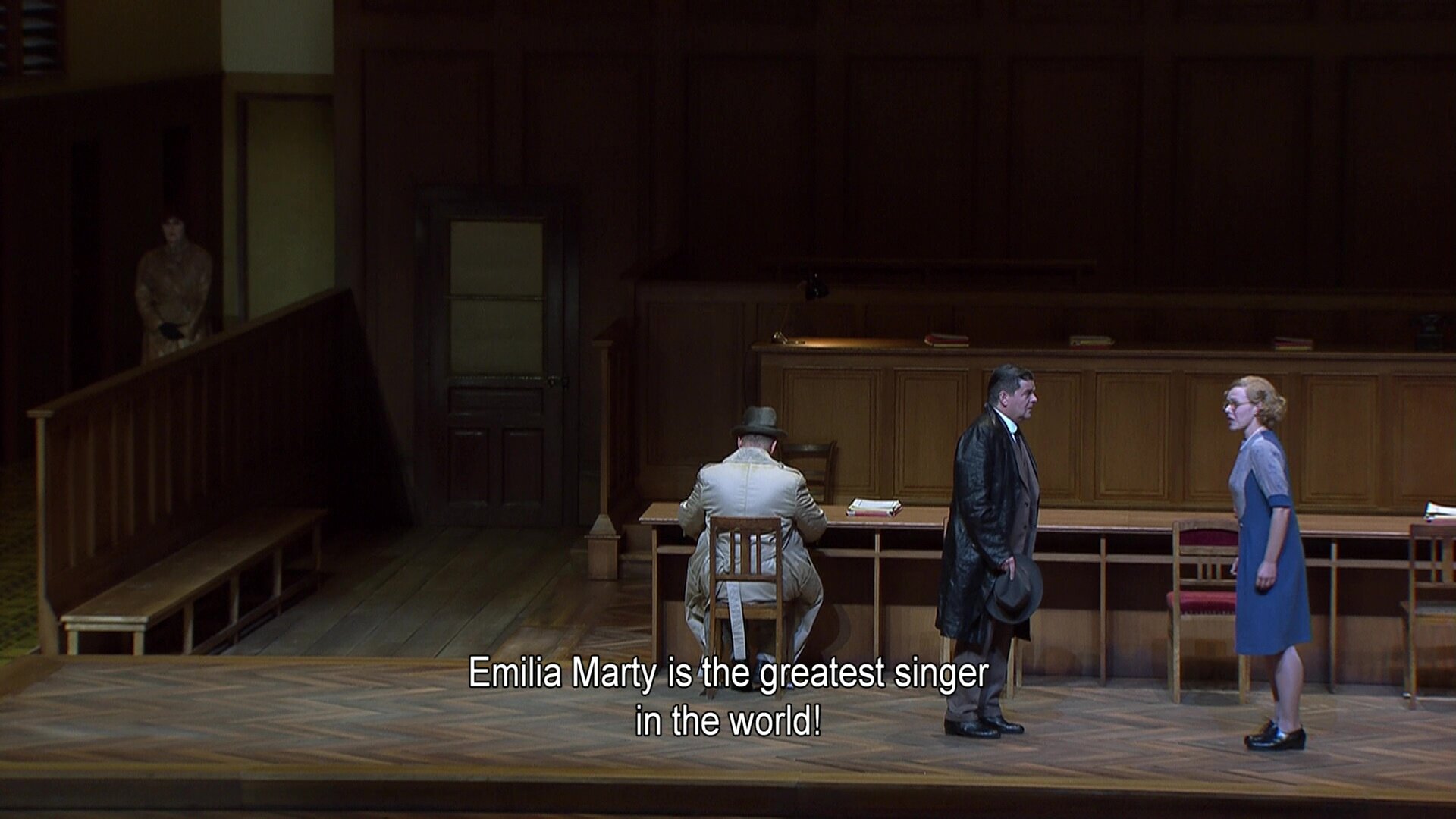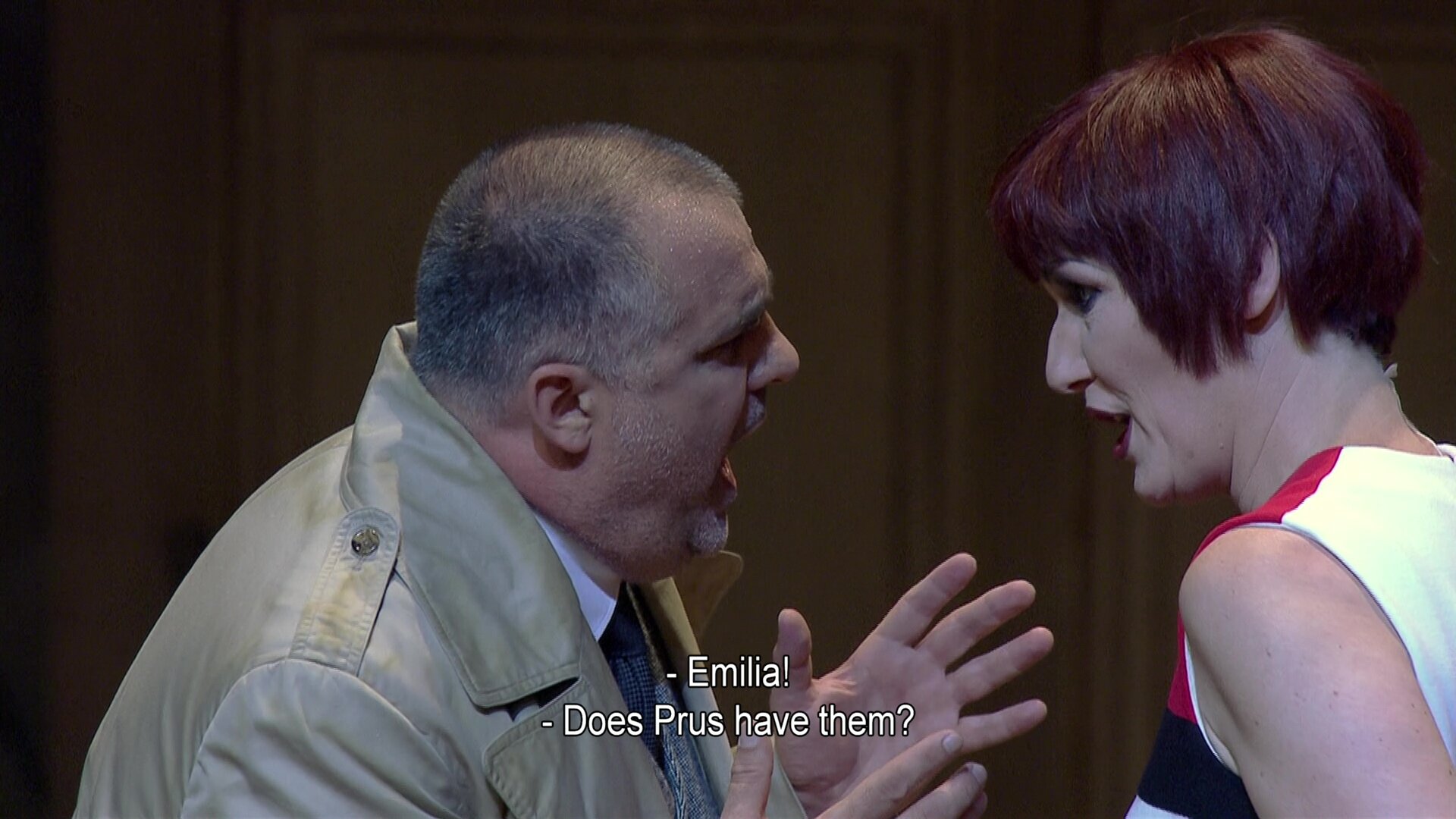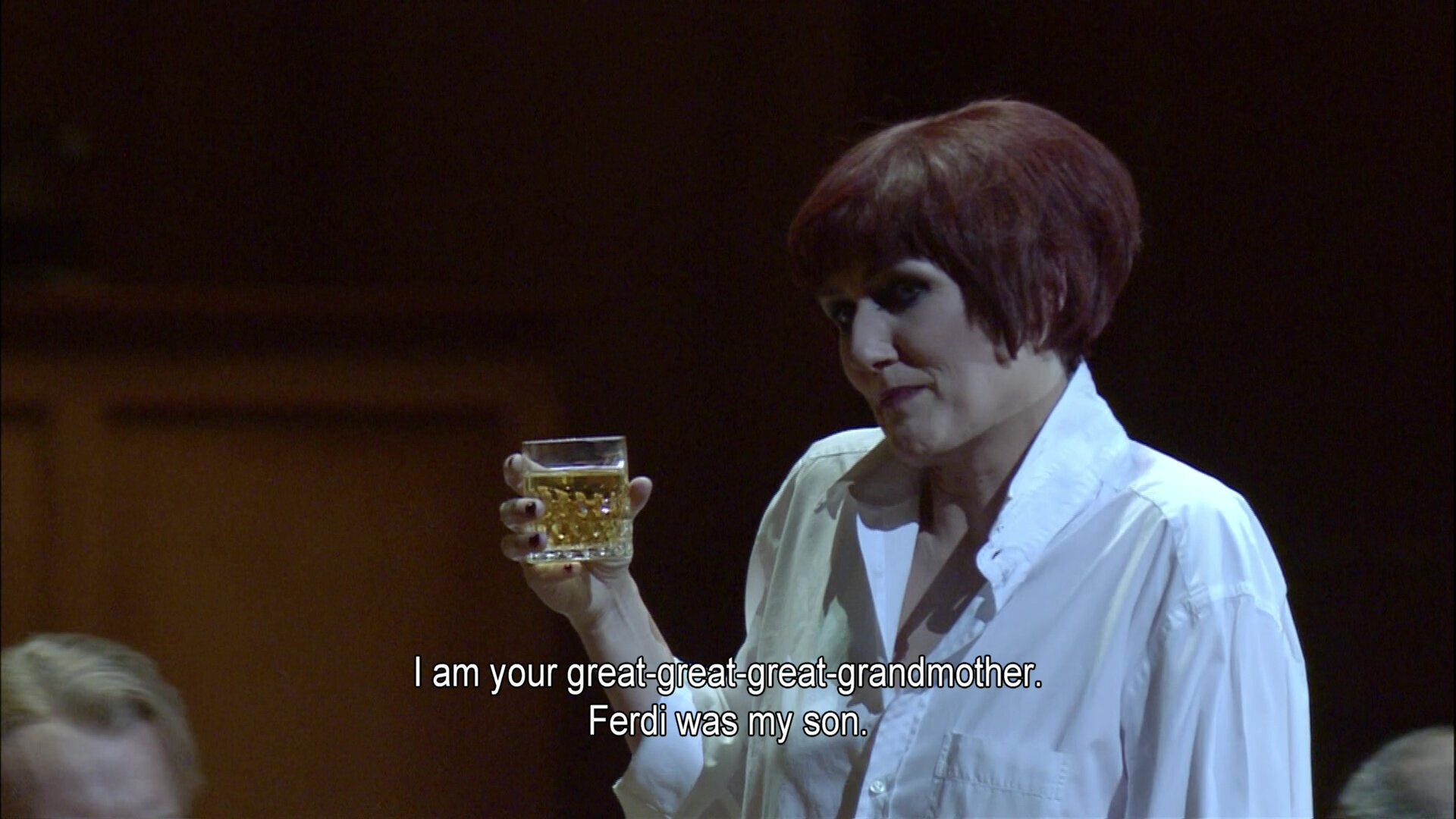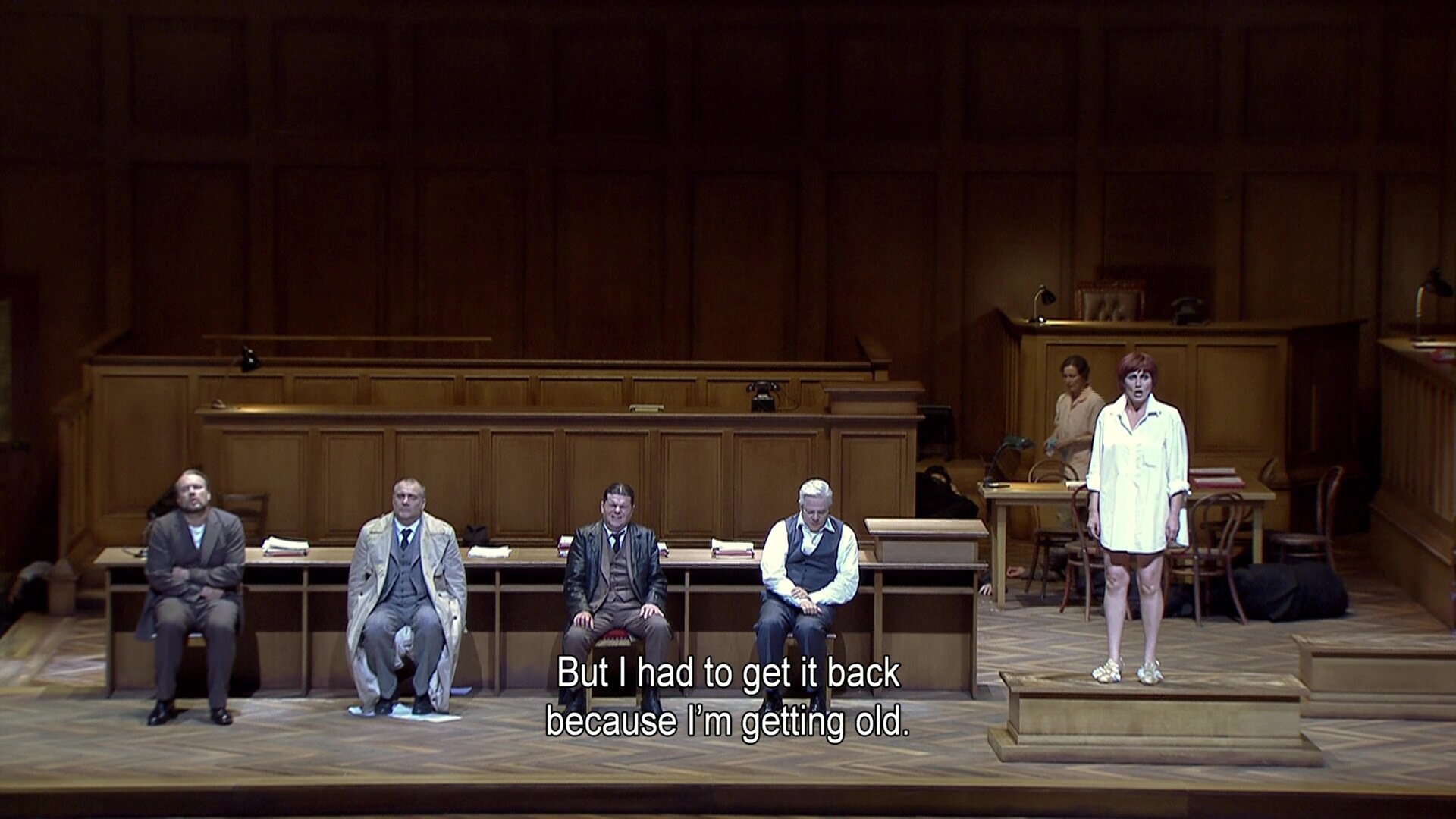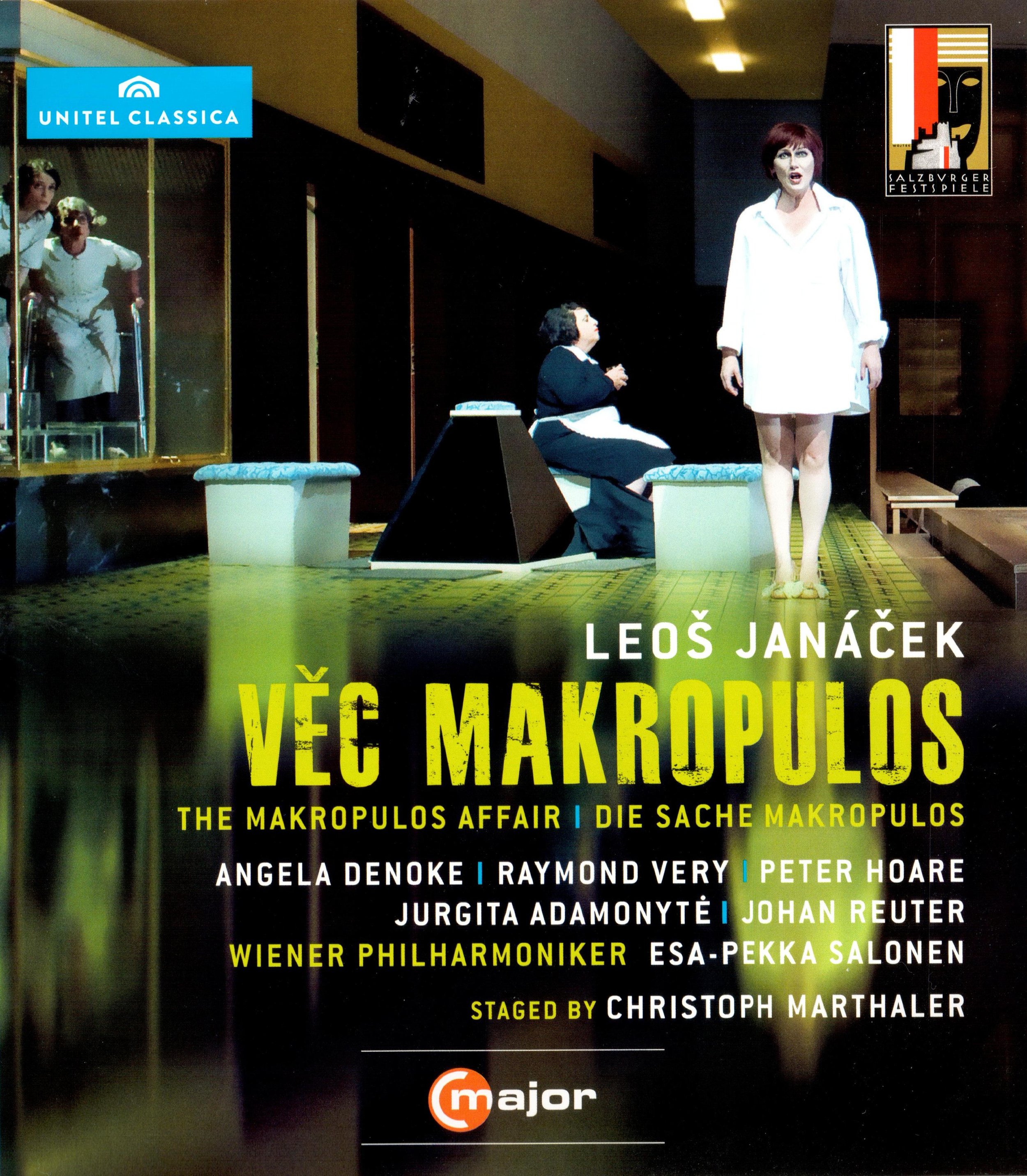
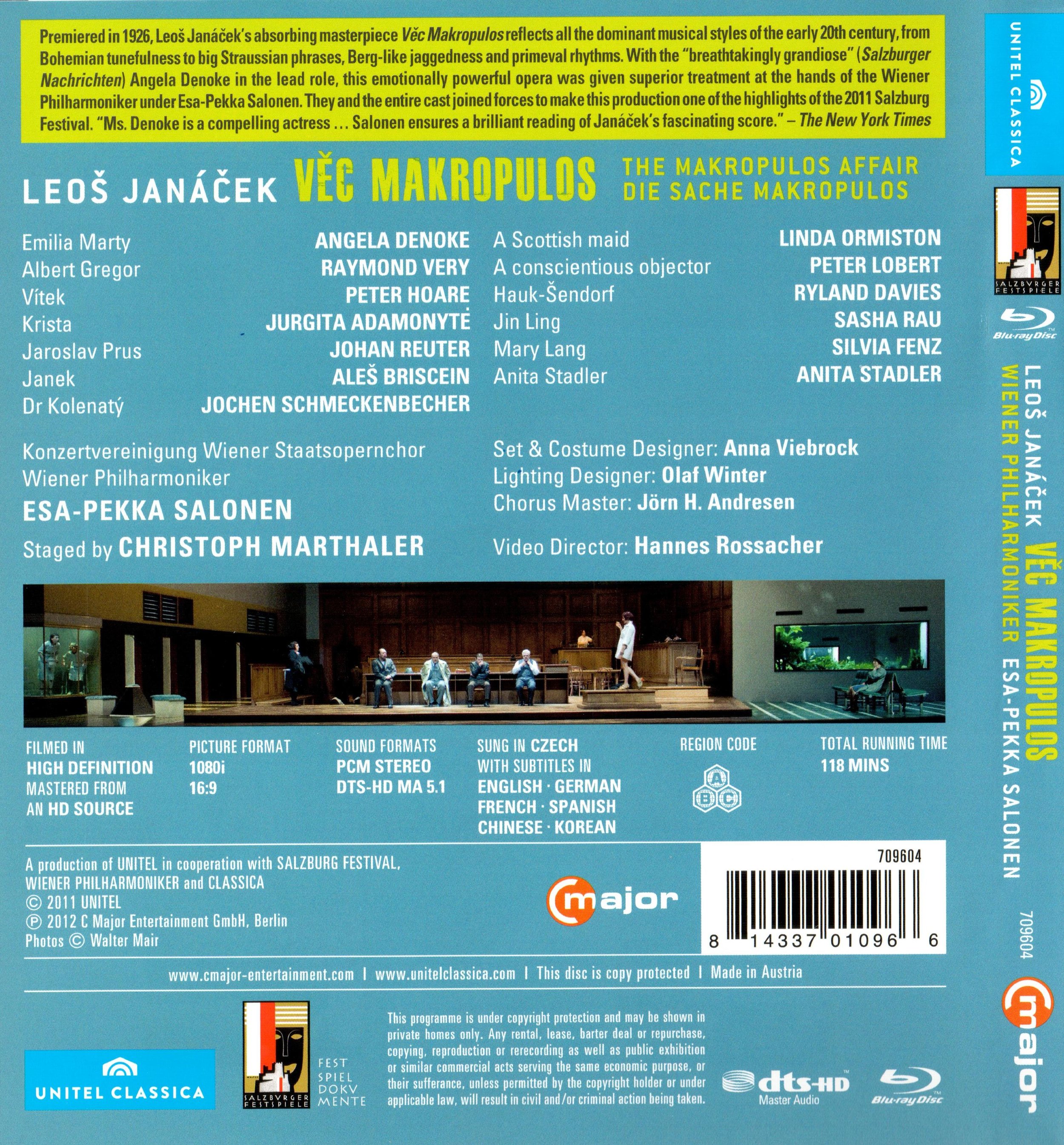
Janáček Věc Makropulos (The Makropulous Thing) opera to a libretto by the composer after Karel Čapek’s play. Directed 2011 by Christoph Marthaler at the Großes Festspielhaus as part of the Salzburg Festival. Stars Angela Denoke (Emilia Marty), Raymond Very (Albert Gregor), Peter Hoare (Vítek, the lawyer's clerk), Jurgita Adamonytė (Krista, his daughter), Johan Reuter (Jaroslav Prus), Aleš Briscein (Janek, his son), Jochen Schmeckenbecher (Dr. Kolenatý, the lawyer), Linda Ormiston (A Scottish maid) Peter Lobert (A conscientious objector), Ryland Davies (Hauk-Šendorf), Sasha Rau (Jin Ling), Silvia Fenz (Mary Lang), and Antia Stadler (Anita Stadler). Esa-Pekka Salonen conducts the Wiener Philharmoniker, Konzertvereinigung Wiener Staatsopernchor (Chorus Master Jörn H. Anderson), and Members of the Angelika Prokopp Sommerakademie of the Wiener Philharmoniker. Set and costume design by Anna Viebrock; lighting design by Olaf Winter. Directed for TV by Hannes Rossacher; produced by Magdalena Herbst. Sung in Czech. Released in 2012, disc has 5.1 dts-HD Master Audio sound. Grade: A-
Věc Makropulos is usually translated as The Makropulos Affair or Case Makropulos, but it should be called The Makropulos Thing. This is perhaps the weirdest opera in the canon because it is (1) a philosophical discourse on the meaning of life, (2) a comedy of manners, (3) although no crime was committed, a who-done-it-type detective story, (4) the only opera ever about a decedent’s probate case that has lasted for 100 years, and (5) the only opera ever with a character who is 337 years old! Director Christoph Marthaler ratchets up the weirdness with surreal set elements and mysterious mute characters who contribute little or nothing directly to the story line. And there is at the end a trained mouse who crosses the front of the entire huge stage eagerly anticipating the yummy mouse treat he will get at the end of his trek!
All this is far too complicated for the poor author of the keepcase booklet. The best synopsis I’ve seen is on Wikipedia (get the story about the opera, not the play by Karel Čapek). All I can hope to do is to show you a few images that maybe will inspire you roll up yours sleeves and give this a try.
First I’ll show you the single set. In the center is an imposing array of furniture that serves as a lawyer’s office and a court room. On the left is a white room behind glass. I think this is a break room in an office somewhere in the city where office clerks can smoke. On the right are reception areas for the law firm, which basically go unused in the opera. A few characters are wandering about the stage waiting with the audience for the play to begin:
Two office clerks enter the break room. I think this is a spoken “Silent Prologue.” The audience hears nothing but sees the conversation in supertitles. The conversation is designed to raise questions for the audience to ponder: Are our lives short or long? If we could live 300 years, would that be good or bad? I tried hard, but I can’t properly identify either of these ladies who instantly create such droll characters:
When the opera opens, we first meet Vitek (Peter Hoare), the paralegal for attorney Dr. Kolenatý. They represent young Albert Gregor in a probate case against young Jaroslav Prus over the inheritance of the estate of one Joseph Prus (also called Pepi Prus). It seems Pepi died without a will 100 years ago. The original combatants in the case (all long dead now) were distant relatives of Pepi on the one side and a Mr. Gregor, also called “Ferdi” on the other side, who claimed that Pepi has entered into a binding contract to leave his property to Ferdi because he was an illegitimate son of Pepi:
Vitek’s daughter Krista (Jurgita Adamonytė) arrives raving about a certain soprano named Emilia Marty whom she heard at the theater. On the left in the shadows is Emilia Marty (Angela Denoke), who is on her way to visit Dr. Kolenatý:
Mr. Gregor (Raymond Very left below) is at the law office to see how his 100-year-old case is doing. Dr. Kolenatý (Jochen Schmeckenbecher) arrives. Both the client and the lawyer are amazed the famous singer has an interest in their case:
Emilia Marty seems to know a great deal about the litigation. And they are astonished when she tells them about a written will of old Pepi Prus!
Kolenatý rushes off to do more discovery based on the tip from Emilia Marty, and he locates the will. Young Prus, who is a high-class gentleman, arrives and recognizes the will. But he will not admit defeat unless it be proved that old Ferdi Gregor was in fact Pepi’s illegitimate son:
So the case goes on! Now you may ask, “Why does Emilia Marty care anything about the case of Gregor vs. Prus? Well, she has her own agenda! There is in the Prus archives a document with the name “Makropulos” on the cover. Emilia wants that document:
Eventually, after many plot twists too complicated to write about her, Emilia gets the document she seeks: The Makropolis Thing. In the meantime Gregor has become hopelessly infatuated with Emilia. She rebuffs his advances and decides it is time to come clean:
The Makropulos thing is a secret formula that lets a person extend his life for 300 years. Emilia was 37 when she acquired the formula, and her 300 years have almost run out. She needs the formula again for a second extension, which would let her live for a total of 637 years! Now she has it in her hands!
But now that Emilia has the Makropulos Thing again, she realizes that she maybe doesn’t want to use it:
She gives it to Krista, who has seen enough by now to make a wise decision:
Please pardon me for spoiling this! The main story here is not so important—the way the story unfolds is the impressive thing. The style of the book was doubtless inspired by the Ibsen plays in which each new line illuminates some older line or lines in clever ways until you finally get the complete picture. But this differs from Ibsen in that it’s a comedy. And on top of that, it’s a comedy that gives you some things to think about.
As to a grade, I’ll start with A+. I’m reducing this to A - because the plot here makes the viewer work so hard and the keepcase booklet offers so little help. I hope this review gives you a kickstart. Good luck!
OR



